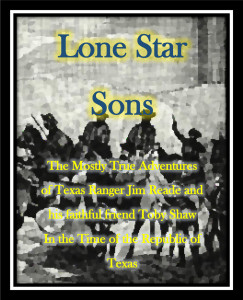 (Part one of my reworking of a certain classic western serial adventure – this one with plot elements lifted from a classic John Wayne Western.)
(Part one of my reworking of a certain classic western serial adventure – this one with plot elements lifted from a classic John Wayne Western.)
“Tell me again, why we are going to Laredo, James?” Toby asked, as he and Jim rode out on the long road toward Monterrey, the road that would lead them south into the contested borderlands. “And why has Captain Jack sent us to escort Mr. Biddle? We both know well that he is very well fit to look after himself. After the matter of the Casa Wilkinson…”
“It is a matter of honor,” Jim replied. “Mr. Biddle did us a good turn, and now we are doing him one. His errand is to do with matters of those Americans who trade in Laredo … where half the town seems to prefer to live under the rule of an autocrat, rather than in a democracy…Have you ever heard of such a thing – moving the town, their homes and businesses over the river and declaring the place to be New Laredo?”
“It is one of those things,” Toby answered, in thoughtful fashion. “Men would prefer to be misruled by those of their kind and color than accept the authority of those who are of another.”
“Seems so,” Jim answered. He used his free hand to wrap the woolen muffler tighter around the lower part of his face. An unseasonable chill wind had come with a blue norther in the middle of the night, and what had been warm and pleasant breeze the previous day was now cutting like a bitter cold knife against his hands and exposed face. He envied the fine kid gloves that Albert Biddle had drawn from the depths of his old-fashioned coachman’s overcoat with its many thick woolen capes.
“But there is another reason for us both to accompany him to Laredo,” Toby persisted. “Is there not?”
“I didn’t think I should tell you until it became necessary,” Jim replied. “But among the rumors that come to Captain Jack’s ears is one; that Gallatin and some unsavory cronies of his have taken a commission from the Mexican governor of Santa Fe to hunt Apache. According to what Jack heard, the governor authorized a bounty for Apache scalps. It’s an unsavory business.”
“And Gallatin is …” Memory and consternation broke across Toby’s usually impassive features. He and Jim were alike haunted by the memories of Jim’s brother Daniel, and four Rangers of Daniel’s company, murdered by Gallatin and his renegades, all for nothing more than being in the way of a wagon-load of tainted gold. Toby had buried the dead and nursed Jim, the sole survivor, back to health. They had been sworn brothers ever since. “A man without tribe, cast off from his people; what makes you think he will be in Laredo, James?”
“He won’t be … but there is a man of the same name, keeping a taproom in Laredo; a brother, a cousin perhaps. He might know where our Gallatin is, and what he is up to. I want to see Gallatin brought to justice,” Jim set his face to firmness, under the muffler, and Toby wisely kept silent for some moments.
“He will be a hard man to catch, Brother,” Toby ventured at last. “And harder to bring to justice; best to serve him as he served your brother and comrades; my vote is for a bullet and a lonely grave in the desert, once the birds have had their fill.”
“So you have said,” Jim replied. It was an old argument, one revived with every report and rumor about the doings of Gallatin. In a corner of Jim’s heart, he kept always the memory of five graves, each marked with a cross made of willow stems and a cairn of rocks, and a sixth which was merely an empty decoy. “Someday, Gallatin will meet with justice. If it is to be, I will be the instrument which administers it.”
“In the meantime,” Albert Biddle added, riding up on Jim’s right hand, as Toby rode on his left, “We are to Laredo and my business with those American citizens of that place.”
“And that business would be?” Jim asked, laughing as Albert Biddle replied, also with a laugh.
“That of my own nation, naturally – just as yours is yours. Ask me no questions, Jim – and I’ll tell no lies. In the meantime, your pleasant company and that of Mr. Shaw is most welcome on a personal level. Knowing of Mr. Cooper’s Deerstalker tales, it is my utmost pleasure to venture onto a trail into the wilderness accompanied by the present-day Texian version.”
“You do me an unlooked-for and unworthy honor,” Jim answered, “Although not to Mr. Shaw – who is truly a modern Chingachgook in every respect.”
“Watching someone exercise their god-given natural skill,” Albert Biddle observed, “Is a pleasure not unlike watching a master-musician perform … an education as well as an entertainment.”
Jim snorted with laughter, “Wait until you taste some of his cooking, Mr. Biddle – there is, alas, no pleasure in it, only sustenance for the body.”
“I do cook better than your mother,” Toby answered, having taken no insult. Jim laughed again. “Touché, Brother. As it happens, we have brought along enough in supplies from the marketplace in Bexar not to have to depend on hunting for some days … now, you did pay mind to Captain Hays with regard to a pair of water canteens for yourself? There is little good water between here and the valley of the Rio Grande, and we may expect several dry marches between here and there.”
“Of course,” Albert Biddle replied. He leaned forward in his comfortable Spanish vaquero saddle and slapped the side of the canteen hanging from the saddle-horn. The canteen was full to the brim with good sweet water from the San Pedro spring; the slap sounded as a hollow thump. “I am not such an arrogant fool as to disregard the advice of those who know whereof they speak.”
“Good,” Jim said. “It’s a long thirsty ride, otherwise – even if it isn’t summer yet.”
Some four days later, the three travelers approached the driest stretch of their passage to Laredo, having chosen to avoid the established wagon road and the curiosity of other travelers as to their errands. Jim thought it a good trade for the slight dangers of travelling with only two other companions. Just before midday, Toby drew rein and shaded his eyes with his hand. He had no need to tell Jim what had drawn his attention – the sight of eight or ten scavenger-birds, circling on motionless wings, on the horizon. That many birds meant something of interest to them, and dead on the ground below.
“Something is the matter?” Albert Biddle likewise shaded his eyes; an intelligent man, for all that he was a Yankee – and he learned fast, which was good, considering. Slow learners in the borderlands tended to wind up as dead as whatever the vultures were circling.
“There is something interesting to them close to where the spring is,” Toby frowned. “I do not like this, Jim. Last year when I traveled this way with my uncle, there was a goat-herder with a little holding outside Laredo who liked to pasture his goats here in spring. The grass grew sweet and thick in the bottom of the arroyos, weeks earlier than anywhere else. That is, if there had not been too much rain.”
“A dead goat, maybe,” Jim suggested, and Toby shrugged in a noncommittal way. “There is no smoke from a campfire,” he said, and they rode on. Their canteens were all but empty, and their three horses were thirsty enough to set a lively pace as they scented the distant water.
(To be continued … there is a baby involved, of course.)


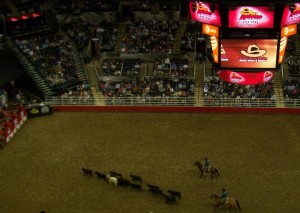
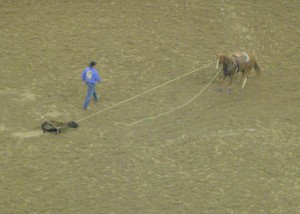
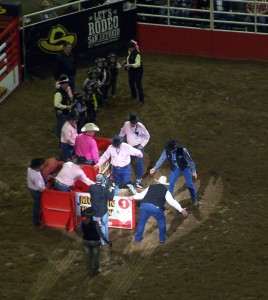
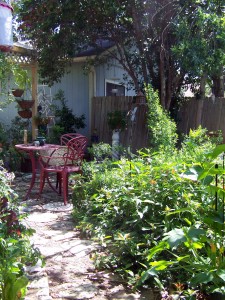
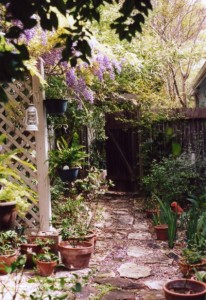
Recent Comments